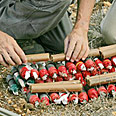
Cluster bomb
צילום: איי אף פי
IDF to halt use of US cluster bombs
Defense officials say army will switch to local-made M-85 bombs in order to limit civilian casualties such as those caused during and after Second Lebanon War, in which 'we were relying on arsenal of American ordnance likely to produce duds'
Israel has cut purchases of US-made cluster bombs, defense officials said on Tuesday, stocking up on supplies of M-85 bombs from the state-owned Israeli Military Industries (IMI). The report has not yet been confirmed by the IDF.
The officials said Israel wants to avoid a repeat of civilian casualties from cluster bombs during and after the Second Lebanon War, thus assuaging worldwide criticism heaped on the State over the issue. More than 100 countries have banned the bombs because of their impreciseness.
According to the United Nations Mine Action Coordination Centre (UNMACC), 30-40 percent of the cluster bombs fired into southern Lebanon by Israel during the war failed to explode, and were later responsible for the deaths of 20 civilians and the wounding of 195.
Israeli defense officials disputed the UNMACC's findings, putting the "dud rate" at less than 15 percent. "But we recognize that this was a problem, caused by the fact that in the first week and half of the war we were relying, pretty much exclusively, on an arsenal of American ordnance that was likely to produce duds, either because of design faults or the fact it had been on the shelf so long," one official said.
"We were cognizant of the civilian costs of the war in Lebanon and the lessons learned from the cluster-bomb issue received especially close attention."
The officials said Israel has since begun switching to the M85 cluster bomb made by Israel Military Industries' (IMI), which says its weapon includes a self-destruct fuse designed to blow up unexploded ordnance.
IMI claims a less than 1 percent dud-rate. A 2007 report on the M85 by Norwegian People's Aid, one of several groups campaigning for a ban on cluster munitions, rated it at more like 10 percent.
Critics say cluster bomb reliability can be impaired by tough terrain or by bomb container shells that fail to open properly – factors not always simulated in laboratory tests, but the Norwegian study confirmed that American cluster munitions used by Israel in Lebanon were less reliable.
"By far the most widely used bomblets were the older US-produced. These bomblets are known to be unreliable and, not surprisingly, a high proportion failed to function and were left unexploded across large areas of land," it said.
Israel and the US, along with other major military powers such as China and Russia, have declined to join a global drive to ban the cluster bomb. But the Pentagon said in July that it would require better safety standards in US-made cluster munitions.










